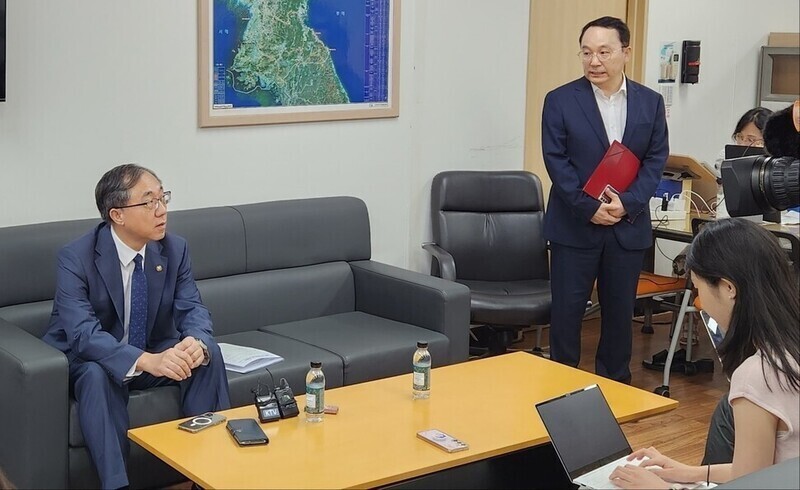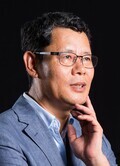hankyoreh
Links to other country sites 다른 나라 사이트 링크
[Column] A new theory of unification in the age of inter-Korean antagonism


By Kim Yeon-chul, former minister of unification and current professor at Inje University
Unification has disappeared in both South and North Korea.
In July, when Hyundai Group Chairperson Hyun Jeong-eun requested the Ministry of Unification grant her permission to visit North Korea, North Korea’s Ministry of Foreign Affairs preemptively rejected the request. The Committee for the Peaceful Reunification of Korea, which is North Korea’s equivalent of our Unification Ministry, has been closed since it announced the suspension of inter-Korean dialogue in August 2019, and its chair has been vacant for a long time as well. Same goes for the Yoon Suk-yeol administration, which has set out to virtually abolish the Unification Ministry through personnel appointments and organizational restructuring. “Unification” has lost its way.
Never has inter-Korean dialogue been absent for such a long period of time during the 70 years following the Korean War. The longest time dialogue between the two Koreas was cut off previously was from August 1980 to April 1984, for roughly three years and eight months. Since the most recent instance of dialogue between South and North Korea was in December 2018, when the two countries held a physical education subcommittee meeting, it has been four years and eight months since public dialogue between the two Koreas has disappeared.
Dialogue behind the scenes may resume at some point, but without public dialogue, it will not continue. Relying on intelligence agencies responsible for under-the-table dialogue rather than the Unification Ministry, in charge of official dialogue, is an anachronism.
Under Kim Jong-un, this “disappearance of unification” reflects worsened inter-Korean relations. If the Kim Jong-il regime emphasized the nation, the Kim Jong-un regime emphasized the state. The Kim Jong-un regime’s “state first” ideology, which has resulted in the dissemination of songs that lauds the state and state symbols and an underscoring of state physical education, runs counter to the theory of unification. As inter-Korean relations took a turn for the worse, the theory of unification as national discourse disappeared as well. The expression “Among our nation” vanished a long time ago.
North Korea’s unification policy has changed steadily, from the traditional “Confederal Republic of Koryo” to a “loose federal system” in 1991 and a “low-level federal system” in 2000 during the inter-Korean summit. In the case of other divided nations, the side with less national power would argue for a confederacy or a low-level federal system while the side with more national power would advocate for a high-level federal system with a higher level of consolidation, the weak raising the threshold due to threats of absorption, the strong attempting to lower the threshold, confident about its ability to absorb.
As the difference in national power between the two Koreas has become so significant as to defy comparison, it is only natural that North Korea’s unification policy has changed from a federal system to something more akin to a union system, and North Korea is referencing unification less and less. By comparison, it is normal for conservatives in South Korea to support a federal system, but unfortunately, their views are stuck in the 1950s.
Over the course of division, conservative forces abused discussions about independent unification for domestic politics. The Park Chung-hee administration used the July 4 South-North Joint Statement in 1972 to push for the Yusin regime, while the Kim Young-sam administration used its North Korea policy as an opportunity to unify conservatives.
Like the Lee Myung-bak administration, the Yoon administration is trying to fill the gap created by hostile North Korea policies with the ideology of “unification through absorption.” Unlike the ideology of absorption, policies of confrontation attest to the fact that South and North Korea exist as independent countries. Ideology and reality contradict each other, and what is left is the abuse of unification issues in domestic politics.
As the age of confrontation draws out, the two-state theory emerged like a fad. Will the problem be solved if South and North Korea live as neighbors, as two independent countries? The reason it is difficult to approach inter-Korean relations like diplomatic relations between nations is the unique characteristics of relations within an ethnic group. In that respect, the inter-Korean Basic Agreement of 1991’s designation of inter-Korean relations as a “special interim relationship stemming from the process toward unification” remains valid. Here, the special relationship constitutes the duality of reality of “two states” and the mission for “one nation.” Finding a balance between the two concepts is the key challenge facing a new theory of unification.
Let’s look at the implications of Germany’s example. When, in 1973, the Bavarian state government filed a suit arguing that the 1972 Basic Treaty between East and West Germany was unconstitutional because it specified unification as an express mission, the German federal constitutional court judged that the treaty was one of international law in character but one of internal relations in content, ruling that it did not violate the mission of reunification. The court had considered the special duality of a divided nation. When Chancellor Helmut Kohl declared during his 1982 inauguration speech that there were two states in Germany but only one nation, he had shown the wisdom of the temporary agreement.
The theory of unification based on nationalism has lost its persuasiveness, but still, the two-state theory cannot be its alternative. How could the two Koreas have normal relations without overcoming division?
Independence, division, and the wartime and postwar order was not decided based on bilateral relations between South and North Korea but by clashes and cooperation between international powers. Considering this, how would we maintain the right to self-determination over the fate of the Korean Peninsula if we deny the unique qualities of internal relations within an ethnic group?
Just as abolishing the unification ministry won’t do away with the mission of unification, forgetting the reality of division won’t eradicate the division regime.
Please direct questions or comments to [english@hani.co.kr]

Editorial・opinion
![[Editorial] Intensifying US-China rivalry means Seoul must address uncertainty with Beijing sooner than later [Editorial] Intensifying US-China rivalry means Seoul must address uncertainty with Beijing sooner than later](https://flexible.img.hani.co.kr/flexible/normal/500/300/imgdb/original/2024/0517/8117159322045222.jpg) [Editorial] Intensifying US-China rivalry means Seoul must address uncertainty with Beijing sooner than later
[Editorial] Intensifying US-China rivalry means Seoul must address uncertainty with Beijing sooner than later![[Column] When ‘fairness’ means hate and violence [Column] When ‘fairness’ means hate and violence](https://flexible.img.hani.co.kr/flexible/normal/500/300/imgdb/original/2024/0516/7417158465908824.jpg) [Column] When ‘fairness’ means hate and violence
[Column] When ‘fairness’ means hate and violence- [Editorial] Yoon must stop abusing authority to shield himself from investigation
- [Column] US troop withdrawal from Korea could be the Acheson Line all over
- [Column] How to win back readers who’ve turned to YouTube for news
- [Column] Welcome to the president’s pity party
- [Editorial] Korea must respond firmly to Japan’s attempt to usurp Line
- [Editorial] Transfers of prosecutors investigating Korea’s first lady send chilling message
- [Column] Will Seoul’s ties with Moscow really recover on their own?
- [Column] Samsung’s ‘lost decade’ and Lee Jae-yong’s mismatched chopsticks
Most viewed articles
- 1[Editorial] Transfers of prosecutors investigating Korea’s first lady send chilling message
- 2[Exclusive] Unearthed memo suggests Gwangju Uprising missing may have been cremated
- 3S. Korea “monitoring developments” after report of secret Chinese police station in Seoul
- 4[Editorial] Intensifying US-China rivalry means Seoul must address uncertainty with Beijing sooner t
- 5Could Korea’s Naver lose control of Line to Japan?
- 6Korea cedes No. 1 spot in overall shipbuilding competitiveness to China
- 7[Column] US troop withdrawal from Korea could be the Acheson Line all over
- 8China, Russia put foot down on US moves in Asia, ratchet up solidarity with N. Korea
- 9Xi, Putin ‘oppose acts of military intimidation’ against N. Korea by US in joint statement
- 10Korea’s first openly trans athlete hopes to prompt a discussion by competing as herself